|
To go back to Page One of Memorial Click This Link
Here
Hungarian Nyilas or Arrow Cross Party
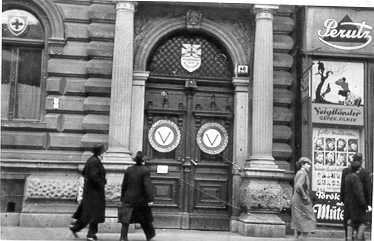 Nyilas Headquarters
Nyilas Headquarters
The Arrow Cross Party (Hungarian: Nyilaskeresztes Párt Hungarista
Mozgalom, literally "Arrow Cross Hungarianist Movement") was a pro-German
anti-Semitic fascist party led by Ferenc Szálasi which ruled Hungary from
October 15, 1944 to January 1945. During its short rule, 80,000 Jews, including
many women, children and old people were deported from Hungary to their deaths.
After the war, Szálasi and other Arrow Cross leaders were tried as war criminals
by Hungarian courts.
The party was founded by Szálasi in 1935 as the Party of National Will but was
outlawed two years later for its violent radicalism. It was reconstituted in
1939 as the Arrow Cross Party, modelled fairly explicitly on the Nazi Party of
Germany. Its iconography was clearly inspired by that of the Nazis; the Arrow
Cross emblem was an ancient symbol of the Magyar tribes who settled Hungary,
thereby representing the racial purity of the Hungarians in much the same way
that the Nazi swastika was supposed to allude to the racial purity of the
Aryans.
The party's ideology was somewhat similar to Nazism - nationalism, the promotion
of agriculture, anti-capitalism, anti-Communism, and militant anti-Semitism. It
subscribed to the Nazi ideology of "master races" which, in Szálasi's view,
included the Hungarians, Germans and Japanese, and it also supported the concept
of an order based on the power of the strongest – what Szálasi called a
"brutally realistic étatism". However, its espousal of a "Greater Hungary" and
Hungarian values (which Szálasi labelled "Hungarizmus" or "Hungarianism")
clashed with Nazi ambitions in central Europe, delaying by several years
Hitler's endorsement of the party.
The Arrow Cross obtained most of its support from a disparate coalition of
military officers, students, nationalists and urban and agricultural workers. It
was only one of a number of similar openly fascist factions in Hungary, but was
by far the most prominent. When it contested the May 1939 elections - the only
ones in which it stood - the party won more than 25% of the vote and 30 seats in
the Hungarian Parliament. It thus became one of the most powerful parties in
Hungary. However, the Arrow Cross was banned on the outbreak of World War II,
forcing it to operate underground.
By 1944, however, it had gained the open support of Germany and the pro-German
Prime Minister Döme Sztójay legalized the party again in March 1944. In October
1944 Hungary's ruler, Regent Miklós Horthy, was forced to resign by the Germans,
who installed the Arrow Cross Party in government and appointed Szálasi as prime
minister and head of state. Its rule was bloody but short-lived, as Soviet and
Romanian forces were already fighting in Hungary even before Szálasi's takeover.
Budapest fell in December 1944 and the Arrow Cross government effectively fell
the following month. Arrow Cross members and German forces continued to fight a
rear-guard action in the far west of Hungary until the end of the war in April
1945.
After the war, many of the Arrow Cross leaders were captured and tried for war
crimes; many, including Szálasi himself, were executed.
Ferenc Szálasi (January 6, 1897-March 12, 1946) was a Fascist and the Prime
Minister of Hungary during the final days of Hungary's participation in World
War II.
Born the son of a soldier in Kassa, Szálasi followed in his father's footsteps
and joined the army at a young age. He eventually became an officer and served
in the army during World War I. In 1925, Szálasi entered the Hungarian General
Staff and by 1933 he had attained the rank of major. Around this time, Szálasi
became fascinated with politics and often lectured on Hungary's political
affairs. Szálasi was a fanatical right winger and a strong proponent of
Hungarism, advocating the expansion of Hungary's borders and the spread of
Hungarian culture and power throughout Europe. In 1935, Szálasi left the army in
order devote his full attention to politics, after which time he established the
Party of National Will, a nationalistic group which was unpopular with the
people. It was eventually outlawed by the government for being too radical.
Unperturbed, Szálasi established the Hungarian National Socialist Party in 1937,
which was also banned. However, Szálasi was able to attract considerable support
to his cause by adopting views that appealed to industrial workers and members
of Hungary's lower classes.
After Germany's Anschluss with Austria in 1938, Szálasi's followers became more
radical and violent in their political activities, and as such Szálasi was
arrested by the Hungarian Secret Police and imprisoned. However, Szálasi managed
to remain a powerful political figure in prison, and was proclaimed leader of
the fascistic Arrow Cross Party (a combination of multiple right wing groups)
when it was expanded in 1938. The party attracted a large number of followers
and in the 1939 elections it gained 30 seats in the Hungarian Parliament, thus
becoming one of the most powerful parties in Hungary. Freed due to a general
amnesty resulting from the Second Vienna Award in 1940, Szálasi returned to
politics. When World War II began, the Arrow Cross Party was officially banned
by Prime Minister Pál Teleki, thus forcing Szálasi to operate in secret. During
this time period, Szálasi gained the support and backing of the Germans, who had
once been opposed to Szálasi due to his advocacy of Hungarian expansionism. When
the pro-German Döme Sztójay became Prime Minister of Hungary in March of 1944,
Szálasi and his supporters were rewarded when the Arrow Cross Party was
legalized by the government, which allowed Szálasi to expand the party even
further. When Sztójay was deposed in August, however, Szálasi once again became
an enemy of the Hungarian government and Regent Miklós Horthy ordered his
arrest. Szálasi, however, was protected by the Germans, who had grown tired of
dealing with Horthy and planned to make Szálasi prime minister. The Germans
forced Horthy to resign as regent in 1944 and appoint Szálasi prime minister and
head of state, thus making Szálasi the sole leader of Hungary.
Upon becoming ruler of Hungary, Szálasi clashed with the Germans on the
treatment of Hungarian Jews. Although an Anti-Semite, Szálasi was against the
mass extermination of Jews and initially refused to deport Hungary's Jews to
Germany. Szálasi's government was still brutally Anti-Semitic, however, and
thousands of Jews were murdered by Arrow Cross men while many thousands more
were put into forced labor programs and ghettos. Szálasi's reign was ultimately
short lived, however, as the Soviet and Romanian armies had been advancing
through Hungary since before Szálasi had taken office. On December 24, 1944, the
Soviets, in alliance with the Romanians, reached Budapest and less than two
months later completely defeated the German and Hungarian soldiers defending it.
Szálasi and his followers continued to operate in Hungary until it was
completely seized in April 1945, after which time Szálasi fled to Austria. After
the war, he was captured by U.S. troops in Germany and returned to Hungary,
where he was tried by the People's Tribunal in Budapest and sentenced to death
for war crimes and crimes against humanity. He was executed in 1946 in Budapest.
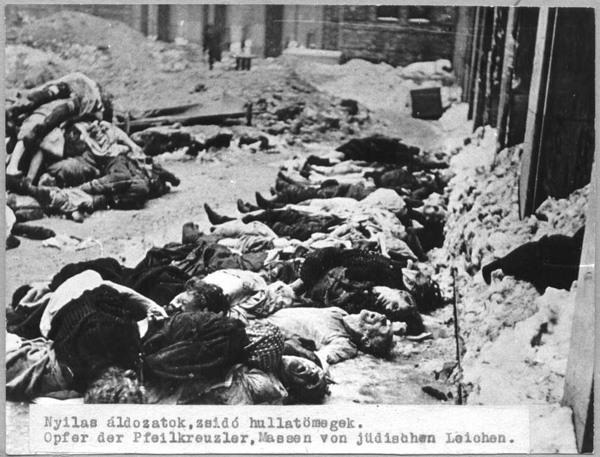
Jewish Victims of the Arrow Cross Party
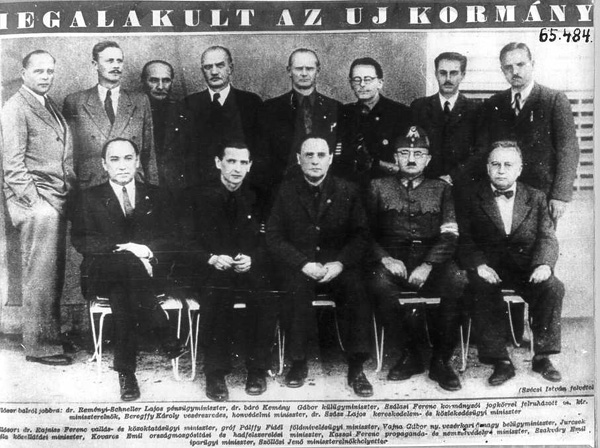
Hungarian Nazi Goverment After March 1944
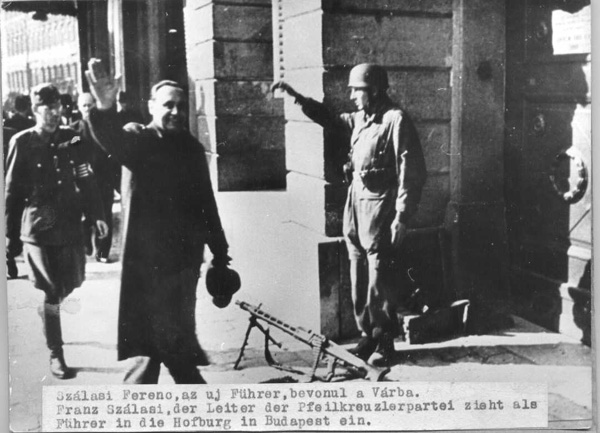
Ferenc Szalasi In 1944
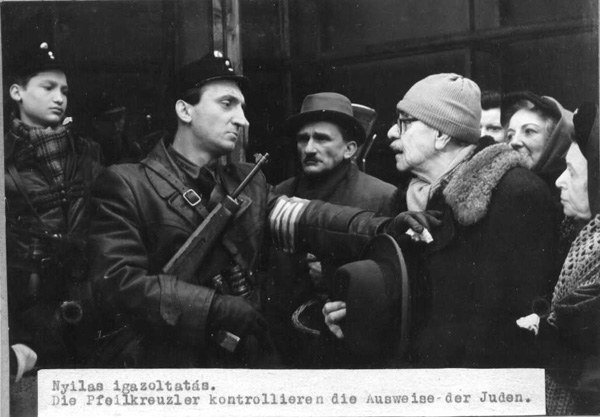
Nyilas Members in Budapest 1944 Harassing Jews
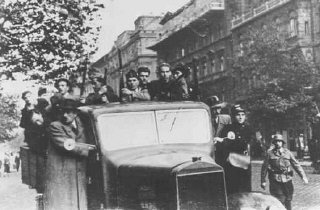 Nyilas in Budapest 1944
Nyilas in Budapest 1944
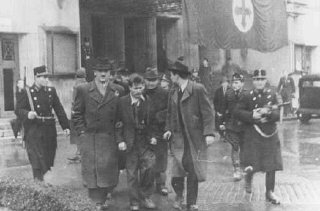 Nyilas
in Budapest 1944 Nyilas
in Budapest 1944
Previous
Page 23
Next
|
 Nyilas Headquarters
Nyilas Headquarters



 Nyilas in Budapest 1944
Nyilas in Budapest 1944 Nyilas
in Budapest 1944
Nyilas
in Budapest 1944